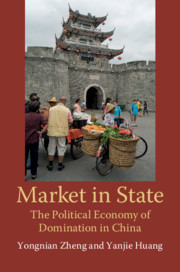Description
Market in State
The Political Economy of Domination in China
Authors: Zheng Yongnian, Huang Yanjie
Uses the framework of 'market in state', to argue that the Chinese economy is state-centered, dominated by political principles over economic principles.
Language: English
Subject for Market in State:
Approximative price 41.94 €
In Print (Delivery period: 14 days).
Add to cart
Market in State
Publication date: 09-2018
490 p. · 15.1x22.8 cm · Paperback
Publication date: 09-2018
490 p. · 15.1x22.8 cm · Paperback
Approximative price 94.05 €
In Print (Delivery period: 14 days).
Add to cart
Market in State
Publication date: 09-2018
490 p. · 15.8x23.5 cm · Hardback
Publication date: 09-2018
490 p. · 15.8x23.5 cm · Hardback
Description
/li>Contents
/li>Biography
/li>
Focusing on the evolving relations between the state and market in the post-Mao reform era, Yongnian Zheng and Yanjie Huang present a theory of Chinese capitalism by identifying and analyzing three layers of the market system in the contemporary Chinese economy. These are, namely, a free market economy at the bottom, state capitalism at the top, and a middle ground in between. By examining Chinese economic practices against the dominant schools of Western political economy and classical Chinese economic thoughts, the authors set out the analytical framework of 'market in state' to conceptualize the market not as an autonomous self-regulating order but part and parcel of a state-centered order. Zheng and Huang show how state (political) principles are dominant over market (economic) principles in China's economy. As the Chinese economy continues to grow and globalize, its internal balance will likely have a large impact upon economies across the world.
Introduction; Part I. Theory: 1. Market, state and capitalism: theories of political economy and China; 2. Market in state: a theory of Chinese political economy; Part II. History: 3. The state and market in imperial China; 4. Origins of the modern Chinese political economy: geopolitics, mobilization, and state building; Part III. Contemporary Institutions: 5. Grassroots capitalism and marketization: dynamics of market reform in the contemporary era; 6. The middle-ground: the nexus between the state and private enterprises; 7. The money regimes: fiscal and monetary reforms and their limits; 8. State capitalism: the centrally-managed SOEs and economic domination; Conclusion.
Yongnian Zheng is Professor and Director of the East Asian Institute at the National University of Singapore. He is the author of The Chinese Communist Party as Organizational Emperor (2010), Technological Empowerment (2007), Globalization and State Transformation in China (Cambridge, 2004) and Discovering Chinese Nationalism in China (Cambridge, 1999).
Yanjie Huang conducts his doctoral research on modern Chinese history at Columbia University, New York. He has published papers and book chapters on China's state sector, food security, and monetary history.
Yanjie Huang conducts his doctoral research on modern Chinese history at Columbia University, New York. He has published papers and book chapters on China's state sector, food security, and monetary history.
© 2024 LAVOISIER S.A.S.




